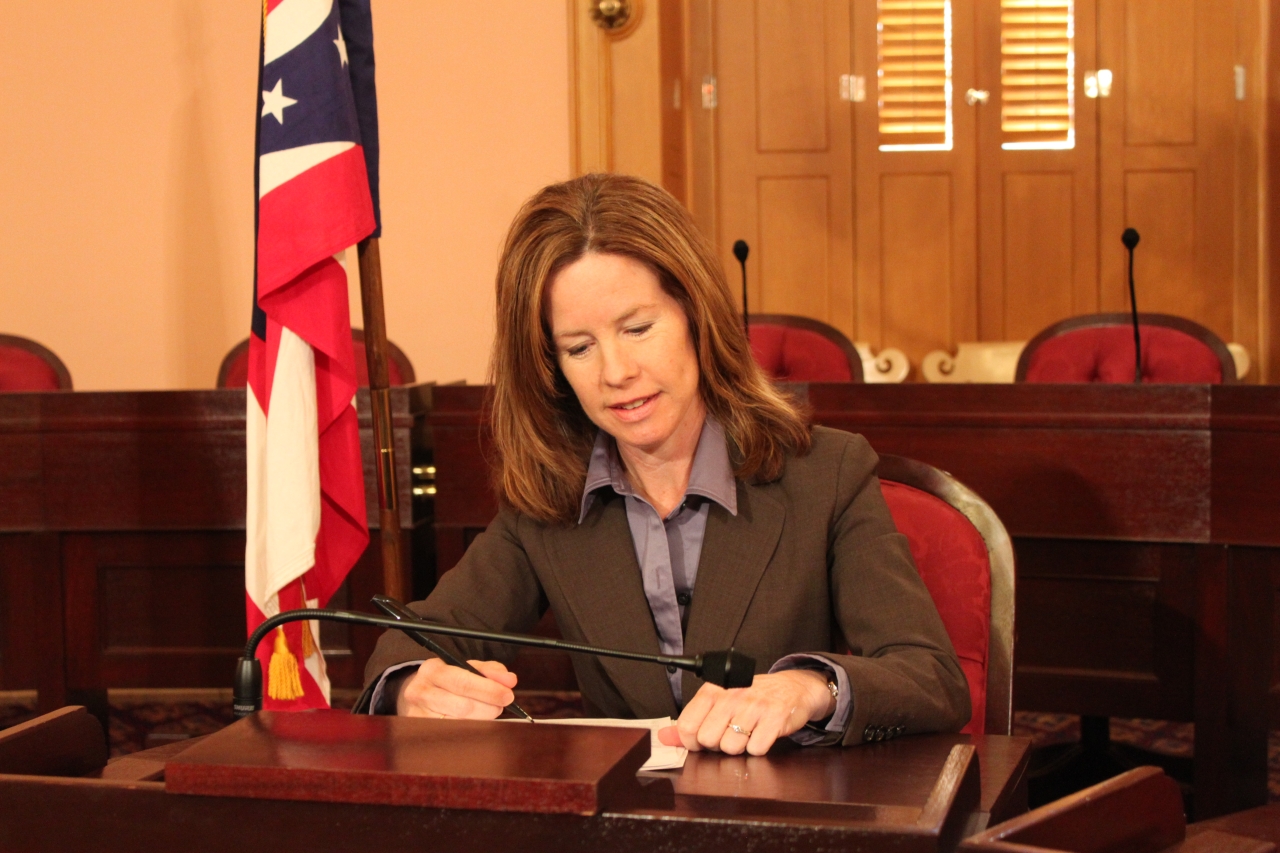Democratic News
Featured Stories
News Feed
The Ohio House Democratic Caucus today sent a letter to Gov. John Kasich asking him to veto a provision in the state’s transportation budget that would make it harder for students to vote in Ohio.
The provision will require anyone who registers to vote in Ohio to surrender their driver’s license if it is from another state, obtain an Ohio driver’s license and register their vehicle with the state. Failure to do so within 30 days results in a criminal offense.
Students and lawmakers have estimated that this imposes a cost of about $75 to $100 for out-of-state American students to vote for local issues and candidates that carry quality of life consequences for students and the communities in which they live.

The Ohio House of Representatives passed legislation Thursday sponsored by State Representative Denise Driehaus (D–Cincinnati) to allow cities over a certain population to create Outdoor Refreshment Districts.
“It is our goal that these outdoor refreshment areas be used to create another incentive for Ohioans to patronize local businesses,” Rep. Driehaus said. “Ultimately, HB 47 is about creating economic vitality in our communities.”
The bill would allow cities with a population of over 35,000 to apply for Outdoor Refreshment District areas within their cities. Specifically, it would allow cities with a population between 35,000 and 50,000 to create one Outdoor Refreshment District, while cities with over 50,000 would have the opportunity to create two.
Wednesday, the Ohio House passed Senate Bill 1, bipartisan legislation to reduce toxic algae in Lake Erie. S.B. 1 comes a little less than a year after 500,000 Toledo residents were left without clean drinking water for three days after toxic algae blooms contaminated the water supply in the western Lake Erie basin.
COLUMBUS— The Ohio House today approved the strictest anti-abortion bill in the nation, the six week ban, largely along party lines. House Bill 69 would outlaw abortion after a fetal heartbeat is detected, as early as 6 weeks gestation—often before a woman knows she is pregnant. H.B. 69 makes an exception only in cases where the life of the mother is at risk and does not include exceptions for rape or incest.
The bill, which was introduced and failed to garner adequate support during the last two General Assemblies, is generally recognized as unconstitutional. Democratic lawmakers say the bill would amount to a near total abortion ban and is in direct violation of Roe v. Wade which established viability, not a heartbeat, as the determining factor for whether or not abortions should be legal.
“I voted against this legislation because I support a woman’s right to make her own health care choices free from government intrusion.”- Rep. Janine Boyd (D-Cleveland Heights)
In 2014, federal judges overturned so-called fetal heartbeat legislation in North Dakota and Arkansas.
State Rep. Michele Lepore-Hagan (D-Youngstown) and State Rep. Heather Bishoff (D-Blacklick) announced today the introduction of legislation aimed at preventing unintended pregnancies and abortions through increased education and access to resources. The Ohio Prevention First Act, House Bill 132, would prevent unintended pregnancies by offering comprehensive, abstinence-inclusive sex education for teens; increasing access to birth control, including emergency contraception for rape survivors; and creating a state Teen Pregnancy Prevention Task.
“Half of all unintended pregnancies end in abortion. If the legislature wants to be serious about preventing abortion, it would devote more resources to providing comprehensive sex-ed and access to contraception-- it is as simple as that,” said Rep. Lepore-Hagan.
State Representative Kathleen Clyde (D-Kent) released the following statement in response to Secretary of State Jon Husted’s comments on the attack on student voting rights:
“Secretary Husted today described voting in Ohio as a "privilege" and described Democratic legislative concerns about the voting rights attached in the transportation budget as "hysteria" and "hysterics". He wrongly claimed the Senate Republicans' provision will not affect voting by students in Ohio when, in reality, it will cause students who register and vote in Ohio to pay $75 or more to get new documents from the BMV or be fined $150 to $1000 and face jail time.
“I believe Secretary Husted is mistaken about the legal implications of this provision and I am disappointed to hear him dismiss the concerns of our congressional representatives, Judge Nathaniel Jones, my colleagues and myself as "hysteria." The Voting Rights Act of 1965 prohibits voter intimidation such as using one's voter registration status to target, investigate, prosecute, and criminally punish them for unrelated matters. Over 100,000 students come to Ohio to further their education and this provision will surely intimidate them and cause them to not register to vote, even though it is their fundamental right to do so.”
Today State Rep. Kathleen Clyde (D–Kent) and Democratic lawmakers stood with the League of Women Voters and an Ohio State student leader to denounce an attack on student voting rights included in the Senate’s version of the state transportation budget.
State Reps. Teresa Fedor (D-Toledo), Michael Ashford (D-Toledo) and Michael P. Sheehy (D-Oregon) recently released the following statement mourning the loss of former House Minority Leader and Toledo Mayor, Councilman Jack Ford:
“The people of Toledo and the State of Ohio mourn the loss of a great leader, colleague and friend Jack Ford. Toledo’s first black mayor and former House Minority Leader, Jack was a tremendous public servant whose legacy of mentorship and selfless service to our city and state will not be forgotten.
“Our most heartfelt thoughts and prayers are with his family, friends and loved ones during this difficult time.”
The Ohio Senate today reinstated a controversial restriction in the state transportation budget that would prohibit communities from requiring that public construction projects completed with state or federal money employ a minimum amount of local Ohioans.
The controversial prohibition returns to House Bill 53 after a House panel nixed the restriction that brought sharp criticism from Akron City officials, State Rep. Emilia Sykes (D-Akron) and other Democratic lawmakers. Sykes successfully drafted an amendment that removed the controversial language.
“This restriction could have a dangerous and untold reach into our urban communities which will disproportionately impact African Americans who remain unemployed at a rate three times higher than the state average,” said Rep. Sykes. “This could hurt local communities and jeopardize Ohio jobs, and we haven’t seen any information that says otherwise.”

From the first six female legislators elected in 1923 to the nearly 200 women who have served in the Ohio General Assembly since, our state is rich in examples of women who have leant their names to Ohio’s history with courage, leadership and determination. We celebrate the many contributions of women during Women’s History Month in March. And at the Ohio Statehouse, we can celebrate our past and present women lawmakers every time we walk through those hallowed halls.






